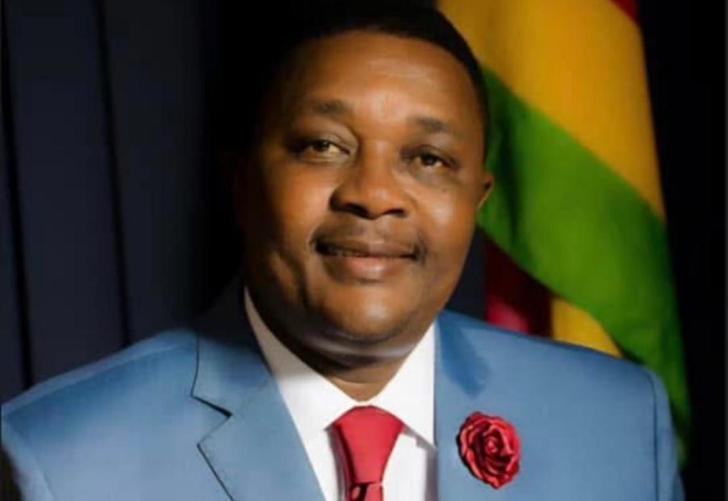News / National
Mzembi failed to meet Mnangagwa
17 Jun 2025 at 09:01hrs |
0 Views

Former Foreign Affairs and Tourism Minister Walter Mzembi was arrested on Thursday after his surprise return to Zimbabwe, contradicting widespread media reports that he had met President Emmerson Mnangagwa to resolve long-standing political disputes.
Mzembi, who fled Zimbabwe in 2018 under a cloud of corruption charges, had returned from Zambia three days ago reportedly in a bid to negotiate his reintegration into Zimbabwean politics following the fallout from the 2017 military coup that ousted the late President Robert Mugabe and brought Mnangagwa to power.
Despite media speculation, sources confirm Mzembi did not meet Mnangagwa during his visit. His attempt to re-engage politically appears to have failed, leaving him exposed to renewed legal action. The Zimbabwe Anti-Corruption Commission (Zacc) acted swiftly, reviving a 2018 corruption case and executing a warrant of arrest issued after he skipped bail several years ago.
Mzembi was initially arrested in January 2018 and later released on bail. He faced accusations of converting public property for personal use, including 16 television sets worth US$800,000, which had been procured for public viewing during the 2010 FIFA World Cup in South Africa. The televisions were allegedly donated to churches, including Walter Magaya's Prophetic Healing and Deliverance Ministries and Emmanuel Makandiwa's United Family International Church.
He also faces allegations of misappropriating US$1.6 million meant for the 2013 United Nations World Tourism Organisation (UNWTO) General Assembly, which was jointly hosted by Zimbabwe and Zambia in Victoria Falls. The National Prosecuting Authority previously recovered US$261,386 of the missing funds and had sought Interpol's help for Mzembi's extradition in 2019 after he absconded trial.
His warrant of arrest was issued in September 2019 after he failed to appear for trial, leading to formal proceedings being set for later that month. Despite repeated calls to return and clear his name, Mzembi remained in self-imposed exile, primarily in South Africa and Zambia.
The former minister was closely aligned with exiled former ministers Saviour Kasukuwere, Jonathan Moyo, and Patrick Zhuwao—key members of Mugabe's inner circle who were pushed out during the coup. Mzembi served as campaign manager for Kasukuwere in the 2023 general elections, in which Kasukuwere attempted to challenge Mnangagwa for the presidency. The Zimbabwean courts, however, barred his candidacy.
Kasukuwere himself returned briefly to Zimbabwe in 2018 but left again after facing charges, including criminal abuse of office and illegal border crossing. Like Mzembi, he also failed to secure assurances of safety or political reprieve.
With Mzembi's failed return and arrest, analysts say the attempt signals an ongoing purge of Mugabe-era loyalists and highlights Mnangagwa's firm grip on power, despite persistent criticism over lack of reforms and the use of state institutions to settle political scores.
Mzembi's legal troubles are now back in full motion, and it remains to be seen whether he will face trial this time or seek another way to escape prosecution. His lawyer at the time of the initial charges was Job Sikhala, a prominent opposition figure and close relative.
This latest development reignites debate over political retribution, the fairness of the justice system, and the continued fallout from the 2017 power transition that continues to shape Zimbabwe's political landscape.
Mzembi, who fled Zimbabwe in 2018 under a cloud of corruption charges, had returned from Zambia three days ago reportedly in a bid to negotiate his reintegration into Zimbabwean politics following the fallout from the 2017 military coup that ousted the late President Robert Mugabe and brought Mnangagwa to power.
Despite media speculation, sources confirm Mzembi did not meet Mnangagwa during his visit. His attempt to re-engage politically appears to have failed, leaving him exposed to renewed legal action. The Zimbabwe Anti-Corruption Commission (Zacc) acted swiftly, reviving a 2018 corruption case and executing a warrant of arrest issued after he skipped bail several years ago.
Mzembi was initially arrested in January 2018 and later released on bail. He faced accusations of converting public property for personal use, including 16 television sets worth US$800,000, which had been procured for public viewing during the 2010 FIFA World Cup in South Africa. The televisions were allegedly donated to churches, including Walter Magaya's Prophetic Healing and Deliverance Ministries and Emmanuel Makandiwa's United Family International Church.
He also faces allegations of misappropriating US$1.6 million meant for the 2013 United Nations World Tourism Organisation (UNWTO) General Assembly, which was jointly hosted by Zimbabwe and Zambia in Victoria Falls. The National Prosecuting Authority previously recovered US$261,386 of the missing funds and had sought Interpol's help for Mzembi's extradition in 2019 after he absconded trial.
The former minister was closely aligned with exiled former ministers Saviour Kasukuwere, Jonathan Moyo, and Patrick Zhuwao—key members of Mugabe's inner circle who were pushed out during the coup. Mzembi served as campaign manager for Kasukuwere in the 2023 general elections, in which Kasukuwere attempted to challenge Mnangagwa for the presidency. The Zimbabwean courts, however, barred his candidacy.
Kasukuwere himself returned briefly to Zimbabwe in 2018 but left again after facing charges, including criminal abuse of office and illegal border crossing. Like Mzembi, he also failed to secure assurances of safety or political reprieve.
With Mzembi's failed return and arrest, analysts say the attempt signals an ongoing purge of Mugabe-era loyalists and highlights Mnangagwa's firm grip on power, despite persistent criticism over lack of reforms and the use of state institutions to settle political scores.
Mzembi's legal troubles are now back in full motion, and it remains to be seen whether he will face trial this time or seek another way to escape prosecution. His lawyer at the time of the initial charges was Job Sikhala, a prominent opposition figure and close relative.
This latest development reignites debate over political retribution, the fairness of the justice system, and the continued fallout from the 2017 power transition that continues to shape Zimbabwe's political landscape.
Source - online
Join the discussion
Loading comments…
































